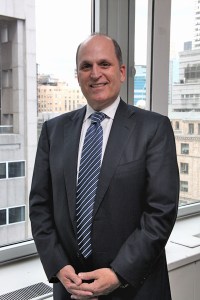Last week, the tenant representation brokerage Cresa named Mark Jaccom its New York president, ending months of speculation as to where Mr. Jaccom would go after leaving the real estate services company Colliers (CIGI) International earlier this year. Mr. Jaccom, a former broker and manager at Studley, helped boost Colliers’s presence in the city’s ultra-competitive brokerage market, but ultimately fell short of highly ambitious goals to grow the firm into a serious rival of the biggest brokerage companies, CBRE and Jones Lang LaSalle. At Cresa, however, Mr. Jaccom gets back to what he knows best from his long tenure at Studley: tenant representation. Mr. Jaccom, who has both a charismatic and aggressive reputation in the brokerage industry, appears to have wisely traded his once-grandiose visions of establishing a new brokerage superpower for the more practical task of guiding a niche player. In a conversation with The Commercial Observer, the always-entertaining Mr. Jaccom made a convincing argument why there will always be room for tenant rep firms like Cresa and why Studley, the biggest brokerage focusing on that specialty, should be on notice that there’s a new competitor in town.

The Commercial Observer: There was a lot of speculation in the real estate brokerage business about where you would go after leaving Colliers. What made you choose Cresa?
Mr. Jaccom: In the summer of 2011, I decided to step down as CEO and became co-chair of the company so that I could concentrate on tenant representation assignments. I left management with the firm in good order to get out there pitching business. I spent a good 15 years at Julien Studley, and that experience of being exclusively a tenant rep broker was in my DNA. As president of Colliers I was preaching what Colliers was about, but when I moved more into going out and getting business, I found it was harder to sell with conviction because we were representing both ends. I can’t mention the client, but I was about to secure a client and almost lost the account because they thought there was a conflict of interest in terms of us representing a landlord. It wasn’t the case. Colliers is a great firm. I was proud to bring it from a family business to a public company, but I thought it was time to find a place that would really suit me in terms of focusing on tenant rep. I did a thorough search. I talked to everyone. With Cresa, which is a tenant-rep-only firm, it was like coming back home. They are strong in many of the NFL cities, Chicago and San Francisco—I’m big on using football terminology. I knew this was going to be my last hoorah. The process of coming into this firm wasn’t just about making money; it was who you are and if you fit the culture and brand, and I really liked that. We’re not just hiring people. In my search I went to their annual outing in Miami where about 400 partners from around the USA were gathered, and there was a lot of former Studley brokers who have now come on to Cresa, and they kept telling me about all the great collaboration and how they work as a tight unit. My feeling at the end of the day is, when you’re pitching business, Studley is always at the dance and there is room for a bigger presence of tenant-rep-only firms.
Is that a big sell to clients, being exclusively a tenant-rep brokerage? A lot of the major firms like Cushman & Wakefield and CBRE and Jones Lang LaSalle seem to do well working with both landlords and tenants.
Some tenants see a conflict of interest and some don’t. We had a special group that just did tenant-rep work at Colliers and it was a very good group. But it’s hard to say in a firm that does multiple disciplines that you just rep tenants. The firm may control a building for one million square feet, and to keep that relationship with the landlord, it needs to fill the space, so where is the true alliance? A lot of firms will say they would never leverage that for an agency. But how many times have you seen a large tenant repped by one of the big brokerages and they put them in a building and then six months later they have that building? It always rubbed me the wrong way. If you are only repping the tenant, you have only one goal in mind. It also means that landlords can never seduce me with an agency. The law firms today often prefer to work with tenant-rep-only firms. There are tenants that will go both ways. As a tenant you need an advocate in your broker and you need to know he or she is on your side 100 percent. Pricing is going up and deals are becoming more complicated. It’s not just rent that you have to worry about. It’s the ownership, where they get financing, who’s behind them. The landlord doesn’t want you to lift up the hood, there are certain no nos, and you just won’t push it if you have a mixed allegiance. But when you rep tenants only, there are no no nos.
What was your time like at Studley? Julien was famous for cultivating a sense of almost ruthless internal competition at the firm. Did you experience it that way?
Let me clear it up. In 1992 they were a $35 million-a-year business. There was tremendous collaboration. It was so close it felt like a cult. I mean we had great camaraderie. But when we hit over $200 million, what happened? Julien was older and we needed to make changes. Mitch [Steir] and Mike Colacino and the top brokers bought Julien out. Mitch and Mike ran things, and my job was to build a national platform. I had some of my greatest years there. And I have to tell you, what you’re saying is not accurate. If Julien saw you were pursuing an account that was someone else’s, he would put you together. Sure, there was competition, but that’s the nature of the beast.
When you joined Colliers, you boldly predicted you would make it into a serious competitor of CBRE, the biggest brokerage in the world.
Look, I brought in a lot of brokers. I underestimated—if you want to be as strong as CB and JLL (JLL)—the dollars and infrastructure you needed. I guess I was a little too bullish. With all of that said, I did build it. I leaned toward building the tenant-rep end. I was trying to do tenant rep at the end of the day. That’s why Cresa rang out to me. They’re a large national firm and they are successful. To build a tenant-rep business here is not going to be as difficult as building Colliers, where I was concentrating on building multiple disciplines and I had 300 employees. I will have 40 people here. I will build a consulting group and brokerage. I will hit the road running.


